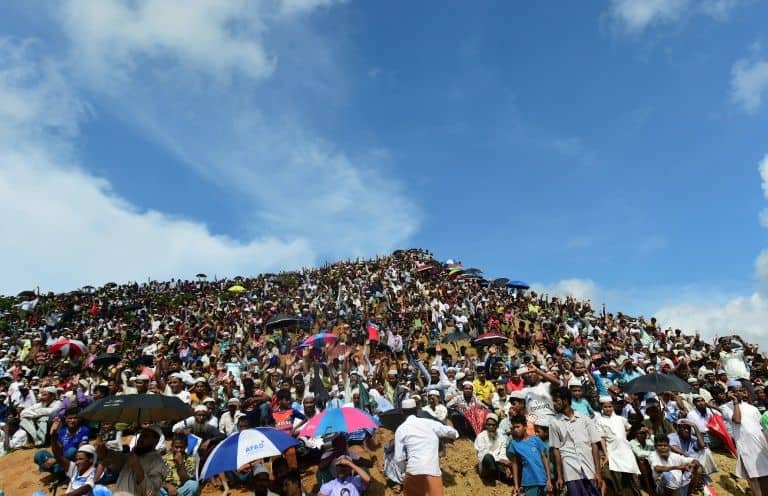Two years ago, the Myanmar military led a ferocious crackdown against Rohingya Muslims, leading to an exodus of some 740,000 people into neighboring Bangladesh.
Here are the key events since 2017:
– Rohingya militants attack –
On August 25, 2017, Rohingya militants stage coordinated attacks on police posts in Myanmar’s Rakhine state, killing at least a dozen police officers.
The army retaliates with operations in Rohingya villages, saying it is trying to flush out insurgents.
The army in the mainly Buddhist nation says it has killed 400 rebels. Regime opponents say most victims were civilians. The United Nations says at least 1,000 were killed in the first two weeks.
– Refugee storm –
By September 5, more than 120,000 Rohingya have flooded into Bangladesh, overwhelming its ill-equipped refugee camps.
Many say they have been victims of abuses by the army and ethnic Rakhine, who are majority Buddhist.
There are already at least 300,000 Rohingya in Bangladesh from previous waves of violence.
– Suu Kyi breaks silence –
Myanmar leader Aung San Suu Kyi on September 19 makes her first public statement on the crisis and says she is open to resettling some of the Rohingya who have fled, pending a “verification process”.
In her speech she offers no concrete solutions to stop what the UN calls “ethnic cleansing” and fails to appease critics around the world.
The Nobel Peace laureate, in power since 2016, visits the conflict zone on November 2, making no statement.
– Repatriation accord –
Bangladesh and Myanmar on November 23 agree to start repatriating refugees in two months, without using the word “Rohingya”.
A day later the UN High Commissioner for Refugees says conditions have not been met for their safe and lasting return.
The accord remains a dead letter.
On December 2 Pope Francis meets Rohingya refugee in Bangladesh, after visiting Myanmar, asking for “forgiveness”.
– Possible ‘genocide’ –
UN human rights chief Zeid Ra’ad Al Hussein calls on December 5 for an international investigation, warning of possible “elements of genocide“.
On March 6, 2018 the UN says Myanmar is continuing its “ethnic cleansing” of the Rohingya with a “campaign of terror and forced starvation”.
On August 25, tens of thousands of Rohingya refugees stage protests to mark the first anniversary of the exodus.
Two days later UN investigators call for an international probe and prosecution of Myanmar’s army chief and five other top military commanders for genocide, crimes against humanity and war crimes. On the same day, Facebook bans the top generals from its platform.
– Reporters jailed –
On September 3 two Reuters journalists accused of breaching Myanmar’s state secrets law while reporting on a Rohingya massacre are jailed for seven years.
After more than 500 days in jail and following immense international pressure, they are freed on May 7, 2019.
– ICC opens preliminary probe –
On September 18, 2018, the prosecutor of the Hague-based International Criminal Court announces a preliminary probe into the military’s alleged crimes against the Rohingya.
UN investigators call for Myanmar’s military to be removed from politics on the same day.
In November an attempt to return 2,260 Rohingya fails, as they refuse to leave without safety guarantees.
On December 20 Myanmar forces carry out new “clearance operations” in Rakhine state after attacks, with one incident blamed on Rohingya.
– US sanctions –
On July 16, 2019, Washington announces sanctions against Myanmar’s army chief Min Aung Hlaing and three other top officers for their role in “ethnic cleansing” of Rohingya.
On August 5, the UN calls for tougher sanctions against Myanmar’s military.
From August 22, some 3,500 Rohingya refugee in Bangladesh are cleared to return home to Myanmar, but none turn up.
The UN accuses Myanmar’s military of sexual violence against Rohingya, and reiterates the conditions are “not favourable” for a safe repatriation.

